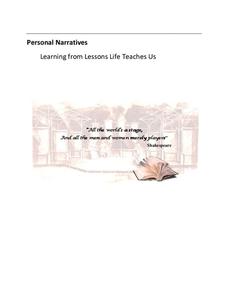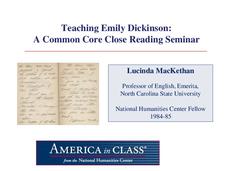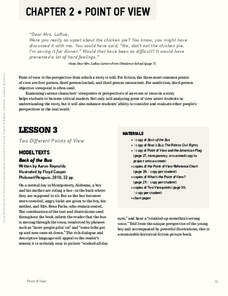Teaching Tolerance
Using Photographs to Teach Social Justice | Confronting Unjust Practices
A powerful photograph of the Freedom Riders of 1961 launches an examination of the de jure and de facto injustices that the civil rights movement of the 1950s and 1960s addressed. Young historians first watch a video and read the Supreme...
Western Justice Center
Underlying Needs
Conflicts arise when underlying needs are unmet. An engaging video introduces viewers to nine basic human needs. Then, through a series of videos, worksheets, and activities, class members learn that by focusing on interests and needs,...
Poetry Society
Writing a Personification List Poem
After a close reading of Sylvia Plath's "Mirror" and Flora de Falbe's "Five Things About the Lake," young poets craft their own personification list poem about a very special place.
PBS
Exploring First-Person Narrative
If you really want to know, this is a terrific lesson all about narratives, which is just a fancy way of saying telling stories. And you get to do it without being phony or anything. My favorite part is that you get to read a passage...
PBS
Shifting Perspectives in Toni Morrison's Beloved
An interactive provides readers with an opportunity to record their reactions to Beloved, Toni Morrison's powerful narrative based on the life of Margaret Garner. Prompts ask them to consider how the shifting point of view contributes to...
PBS
The Power of Personal Narrative
Personal narratives are powerful things. Whether told from the first-person or third-person point of view, whether in the form of an essay, a short story, novel, or video, whether fiction or fact, they capture readers and give them...
Teach Engineering
You Are There... First Flight
Glide into the study of flight. An engaging lesson plan has scholars research information on the Wright brothers. They develop props and produce a recreation of the first flight at Kitty Hawk. They then report on the event as if they...
Thoughtful Education Press
Personal Narratives: Learning from Lessons Life Teaches Us
"First Appearance," Mark Twain's tale about overcoming stage fright, serves as a model of a personal narrative and gets young writers thinking about milestones in their own lives. After examining student models and considering the...
National Humanities Center
Teaching Emily Dickinson: A Common Core Close Reading Seminar
Three of Emily Dickinson's poems, "I like to see it," "Because I could not stop for Death," and "We grow accustomed to the Dark," provide instructors with an opportunity to model for class members how to use close reading strategies to...
Channel Islands Film
Step Into the Shoes
Small groups create skits that illustrate the different perspectives of those involved in the transitioning of Santa Rose island from private ownership to National Park.
EngageNY
Grade 9 ELA Module 4, Unit 1, Lesson 12
Anna McMullen's opinion piece "Bangladesh Factory Collapse: Who Really Pays for our Cheap Clothes?" offers readers another opportunity to examine how writers craft and support their arguments. After reading McMullen's article, class...
University of Virginia
Analyzing Social Commentary in The Adventures of Huckleberry Finn
The Adventures of Huckleberry Finn continues to be one of the most frequently banned books. The satire and social commentary present challenges when using the book as a core text. Direct readers' attention to how Twain uses plot,...
English Worksheets Land
Point of View
Point of view—first, second, and third person—is the focus of a worksheet in which scholars read, identify, and color sentences.
English Worksheets Land
Out to Lunch
Enhance instruction and practice reading with a worksheet that doesn't just ask scholars to identify a sentence's point of view, but also poses the question, How do you know?
English Worksheets Land
Identifying Narrative Perspective
First and third person points of view are the focus of a worksheet that has four practice passages that allow learners to identify the appropriate perspective. Then, they must respond and explain how they know.
Santa Ana Unified School District
The Power of Point of View
Sometimes a whole story can change based on the perspective of the person telling it. Practice identifying and analyzing point of view in various reading passages and writing assignments with a language arts packet, complete with Common...
Scholastic
Point of View
The point of view in a story can dramatically change the story itself. Focus on finding the points of view in various reading passages with a language arts packet, which includes fiction and nonfiction text.
Manchester College
What’s Your Point of View?
Work on deciphering the point of view of various pieces of literature. As readers review the concepts of first, second, and third person perspective, they apply what they know to different passages.
K12 Reader
Point of View: Who Is Telling the Story?
See how famous books of literature have different perspectives with a short worksheet. After reviewing the difference between first and third person points of view, learners look over six passages from various novels and decide which...
K12 Reader
Narrator’s Point of View Flow Chart
How can you tell what point of view a narrator is using, and why does it matter when reading or writing? Use a handy flow chart to determine whether or not your narrator is telling the story from a first or third person point of view.
K12 Reader
Change the Point of View: Third Person to First Person
Use Jack London's The Call of the Wild to help young writers learn the difference between first and third person points of view. After they read a passage from the novel, they rewrite it in the first person point of view.
K12 Reader
Narrator and Point of View
Point of view is important when choosing a narrator. Help young writers distinguish between first and third person point of view with an activity that features excerpts from Robert Louis Stevenson's Treasure Island. After reading four...
K12 Reader
Change the Point of View: First Person and Third Person
How is a story different when told from various points of view? Learn about first and third person points of view with an activity based on Robert Louis Stevenson's Treasure Island. Readers examine a passage written in first person, then...
Curated OER
Points of View
Cinderella is a classic love story when Cinderella is the protagonist—but what happens if a stepsister tells the story? Focus on point of view with a lesson about fairy tales and story elements. After reading a few familiar fairy tales,...

























